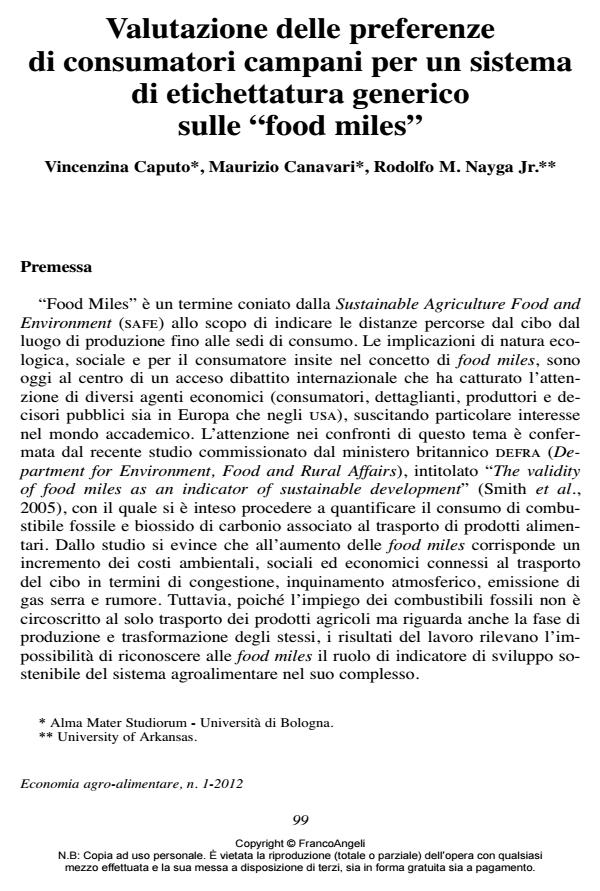Evaluation of Campania's consumers preferences for a generic food miles labeling system
Journal title ECONOMIA AGRO-ALIMENTARE
Author/s Vincenzina Caputo, Maurizio Canavari, Jr. Rodolfo M. Nayga
Publishing Year 2012 Issue 2012/1
Language Italian Pages 17 P. 99-115 File size 273 KB
DOI 10.3280/ECAG2012-001005
DOI is like a bar code for intellectual property: to have more infomation
click here
Below, you can see the article first page
If you want to buy this article in PDF format, you can do it, following the instructions to buy download credits

FrancoAngeli is member of Publishers International Linking Association, Inc (PILA), a not-for-profit association which run the CrossRef service enabling links to and from online scholarly content.
Our study is aimed at evaluating whether or not different food miles information displayed on labels such as information on the distance and time that the food traveled (nKm) and information on CO2 emission (CO2) during food transportation can affect consumer choice in the case of fresh tomato product. We also examined: (i) the level of sensitivity and knowledge of consumers with regard to the impacts of agro-food system in terms of environmental pollution; (ii) consumers’ perception of the effects produced by food transportation; (iii) the degree of importance that consumers attach to information directly or indirectly related to the sustainability of a food product. We conducted a quantitative survey in Naples (Italy) using a discrete choice approach. The data were analyzed using univariate analysis techniques (frequencies) and the estimation of the multinomial logit model (mnl). The results of the univariate analysis show that respondents actually perceive food products distribution as the phase that causes a high negative impact on the environment. The results of the mnl model suggest that on average consumers choices are affected by all the attributes of fresh tomato included in the experimental design. However. a comparison across different fresh tomato attributes suggests that respondents in our sample get the highest utility when nkm label is present, followed by the presence of other sustainability-linked attributes such as organic, CO2.
Keywords: Food miles, consumer preferences, multinomial logit model, willingness to pay, Naples
Jel codes: D12, M31, Q00
- Determinants of Fruit Purchasing Decision Among Singaporean Consumers: An Empirical Study Chubashini Suntharalingam, Thanuja Rathakrishnan, Suhana Safari, in Journal of International Food & Agribusiness Marketing /2023 pp.336
DOI: 10.1080/08974438.2021.2006106 - Green marketing strategies in the dairy sector: Consumer‐stated preferences for carbon footprint labels Maurizio Canavari, Silvia Coderoni, in Strategic Change /2019 pp.233
DOI: 10.1002/jsc.2264
Vincenzina Caputo, Maurizio Canavari, Jr. Rodolfo M. Nayga, Valutazione delle preferenze di consumatori campani per un sistema di etichettatura generico sulle "food miles" in "ECONOMIA AGRO-ALIMENTARE" 1/2012, pp 99-115, DOI: 10.3280/ECAG2012-001005